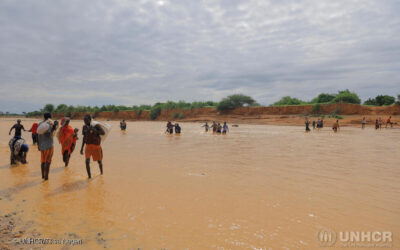Publications and reports
Understanding Refugee Return: Key Findings, Gaps, and Future Research
Understanding Refugee Return: Key Findings, Gaps, and Future ResearchThe return of refugees to their home countries is often regarded as a desirable outcome in displacement contexts, enabling individuals to rebuild their lives in familiar environments. Nevertheless,...
Host Communities and Refugees in the East and Horn of Africa and the Great Lakes
This JDC Digest explores the impacts of forced displacement on host communities in the EHAGL region, as well as opportunities to facilitate opportunities for refugees and other forcibly displaced persons through mobility, assistance and inclusion into national services.
The impact of climate change on forced displacement
Understanding the impact of climate change on forced displacement is critical to informing solutions. The latest scientific findings confirm that climate change is a factor in displacement, albeit unquantified, and that climate and weather extremes are increasingly driving displacement. This paper examines the degree to which climate change is influencing and amplifying the multiple underlying risk drivers of displacement.
Labor Market Access and Outcomes for Refugees
Refugees’ right to work is protected by international law but often violated in practice. This Digest discusses the barriers that host governments impose on refugees’ labor market access and reviews the academic research on the effects of these policies and practices have on refugees and host communities.
The impact of forced displacement on housing and urban settlement in host communities
Findings in the literature suggest that the sudden and often massive nature of refugee inflows, combined with the fact that housing supply is mostly unresponsive in the short-term, has the potential to affect housing prices and generate substantial changes in housing preferences.
Refugee Emergencies and Attitudes Towards Refugees: Some Insights from the Academic Literature
The conflict in Ukraine has generated a large inflow of refugees into European countries, with more than five million people having fled to neighboring countries. So far, the public response has been generally positive, with large shares of the European population being in favor of the policies implemented to host and support the Ukrainian refugees.
The Gender Dimensions of Forced Displacement: Findings from New Empirical Analysis
The Gender Dimensions of Forced Displacement: Findings from New Empirical AnalysisTo date, research and analysis of the gendered dimensions of forced displacement have been limited. This Quarterly Digest highlights findings from a new, major World Bank Research...
Data and Research on Children and Youth in Forced Displacement: Identifying Gaps and Opportunities
Traditional approaches to managing forced displacement remain largely child blind. This third JDC Quarterly Digest highlights some examples of research which contribute to closing these gaps, by focusing on three main areas of investigation: mental health risks faced by forcibly displaced children; evidence from existing evaluations and assessments on ‘what works’; and emerging research into the use of technological innovations for the management of child migration and displacement data.
Forced Displacement and Educational Outcomes: Evidence, Innovations, and Policy Indications
This JDC Quarterly Digest focuses on the impacts of forced displacement on education outcomes for internally displaced populations, refugees and their host communities. It further looks at some of the policies and interventions that provide strong evidence for a shift towards national inclusive education systems and calls for strengthening the evidence base on what works to create sustainable, inclusive solutions.
Long-Term Consequences of Forced Displacement: Three Salient Themes
In this JDC Quarterly Digest, we seek to understand whether any short-term benefits from forced displacement accruing to host countries dissipate or persist over time, particularly when refugees return to their countries of origin or relocate elsewhere. Additionally, in contexts where large inflows of refugees lead to adverse impacts on host communities in the short-term, whether these problems resolve in the longer-term.






